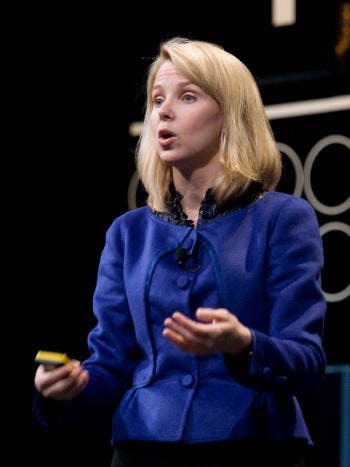By Michael R. Greco
Yahoo recently named longtime Google executive Marissa Mayer as its new CEO. Since the announcement, Twitter has been aflutter with comments about how this could happen.
One Tweeter remarked: “Whoa. Either Marissa Mayer didn’t have a non-compete or no one at Google thinks Yahoo qualifies as competition.” Another tweet speculates that she must have at least signed a confidentiality agreement.
These Tweeters are not alone in their curiosity. Over the past 24 hours I have been asked many questions by friends and family alike about this move. Here’s my take.
Didn’t she have a non-compete?
Probably not. Of course, I can’t say for sure as I am not privy to her employment arrangements with Google, but my strong guess is that she does not have a non-compete that facially forbids her from accepting employment with a competitor.
Such an agreement would be unenforceable in California where section 16600 of the Business and Professions Code prohibits non-compete agreements, except in limited circumstances that do not apply here. That being said, she most likely executed some sort of confidentiality agreement along the way, and she has a statutory obligation not to misappropriate Google’s trade secrets. (For more on the difference between non-competes, confidentiality agreements, and trade secrets, click here).
Can Google stop her from going to Yahoo?
That’s a tough one. The odds makers in Vegas would surely bet against it for multiple reasons.
As noted above, Mayer likely does not have a non-compete agreement, and if she does, it likely runs afoul of California law. Moreover, California courts have unequivocally rejected the inevitable disclosure doctrine, a judicial doctrine by which courts will stop an ex-employee from working for a competitor if the employee’s new job will inevitably lead to the disclosure of the former employer’s trade secrets. See Whyte v. Schlage Lock Company.
If you ask Google, I am sure they believe that Mayer cannot possibly assume her new role at Yahoo without inevitably drawing upon her knowledge of Google’s trade secrets. Hewlett-Packard surely felt this way when its former CEO Mark Hurd left to assume control at Oracle.
Despite California’s rejection of the inevitable disclosure doctrine, a careful read of California case law suggests the issue may not be as clear cut as it seems.
 In Whyte v. Schlage, the court emphasized that it was considering (and rejecting) the inevitable disclosure doctrine “as an alternative to proof of actual or threatened misappropriation [pursuant to the California Uniform Trade Secrets Act]….” Implicit in the appellate court’s opinion is that under California law, there is a difference between “threatened misappropriation” under the CUTSA, on the one hand, and inevitable disclosure, on the other hand.
In Whyte v. Schlage, the court emphasized that it was considering (and rejecting) the inevitable disclosure doctrine “as an alternative to proof of actual or threatened misappropriation [pursuant to the California Uniform Trade Secrets Act]….” Implicit in the appellate court’s opinion is that under California law, there is a difference between “threatened misappropriation” under the CUTSA, on the one hand, and inevitable disclosure, on the other hand.
The lower court could have found a threatened misappropriation and issued relief pursuant to the CUTSA. So there seems to be a legitimate question as to what remedy a California court can employ to enjoin threatened misappropriation. Safe money bets that Google’s lawyers have already analyzed this issue and identified it as a possible grounds for future litigation if they uncover any conduct suggesting that Mayer intends to utilize her knowledge of Google’s trade secrets.
Should Google be concerned?
Absolutely. On the outside, Google has been calm and collected (at least, so far). Google’s CEO graciously commented that Mayer made many contributions to Google and that her talents will be missed.
Of course, this statement is not at all inconsistent with future litigation.
But, yes, Google should be concerned. In addition to losing an extremely talented and long tenured employee, that same employee has walked straight across the proverbial street to the top of one of Google’s fiercist competitors, and she has done so with a head full of knowledge about the secrets to Google’s success.
To make matters worse, Mayer is widely regarded as charismatic and inspiring. Surely, numerous Google employees will be reaching out to see if she has any interest in hiring them.
If Google can’t stop her, what can they do?
For starters, Google will take a long hard look at the California Uniform Trade Secrets Act and the numerous cases interpreting and applying the statute. Any legal action by Google is certain to include a claim for threatened misappropriation described above.
Next, Google will have to consider claims for unfair competition, breach of duty of loyalty, civil conspiracy, and possibly a claim under the Computer Fraud & Abuse Act, although a CFAA claim seems unlikely unless Mayer did something unbefitting the level of intellect widely attributed to her. (For a melange of posts discussing the CFAA, click here.)
Did her looks play a role in her career success?
Yes, someone actually asked me this ridiculous question! Gimme a break!
Despite the litany of idiotic articles denominating Mayer as a “sexy geek,” the reality is that she is an incredibly intelligent and talented woman. If you doubt it, listen to her talk about her work and her career.
She graduated with honors from Stanford University with a B.S. in symbolic systems and an M.S. in computer science. She joined Google as its 20th employee in 1999, turning down more than a dozen offers from other companies.
In my humble opinion, her meteoric rise is attributable to her passion for her work. Of equal importance is her vision. Like other successful executives, Mayer believes that her work can change the world.
She may be right. I wrote this article with the assistance of products from Google that Mayer helped to design. Surely, she can thank Google for her success, but Google owes her a measure of gratitude as well. That gratitude may not be readily apparent, however, in court papers should Google decide to file suit.
Stayed tuned. We haven’t heard the last of Marissa Mayer.
This was originally published on Fisher & Phillips Non-Compete and Trade Secrets blog.
